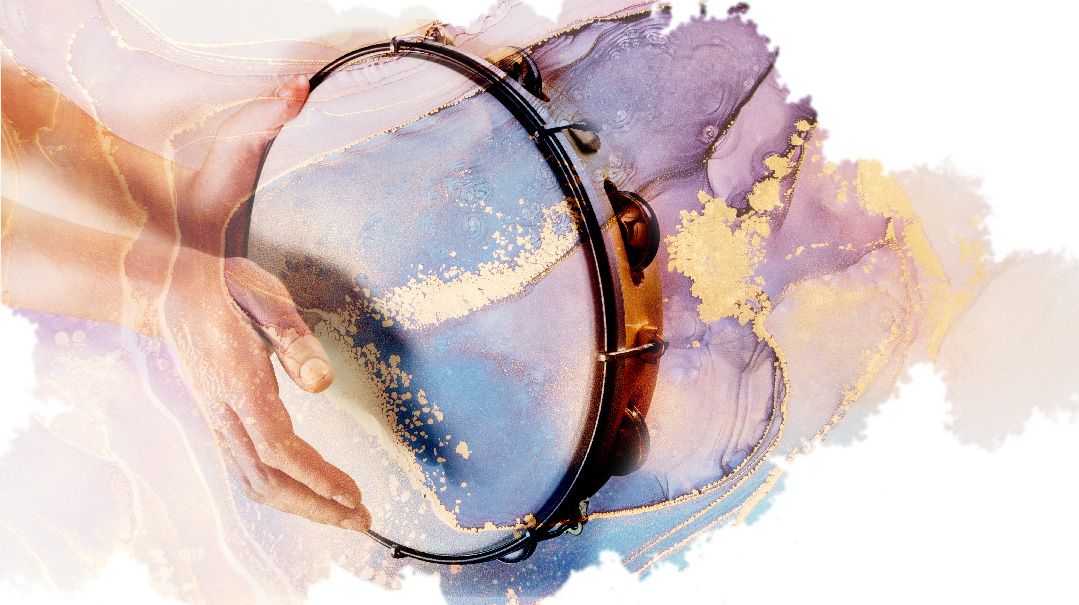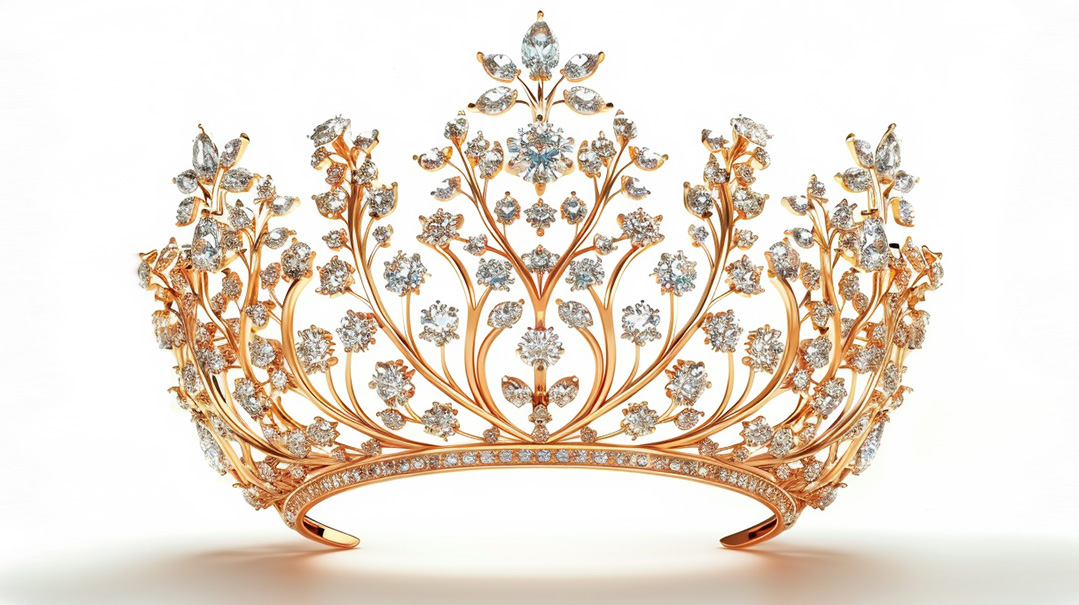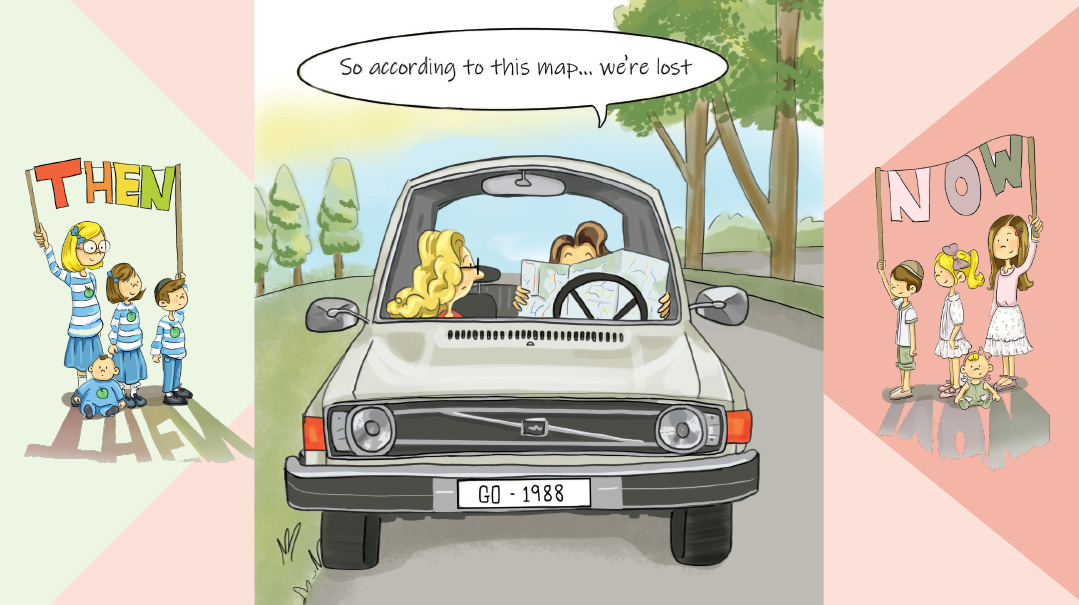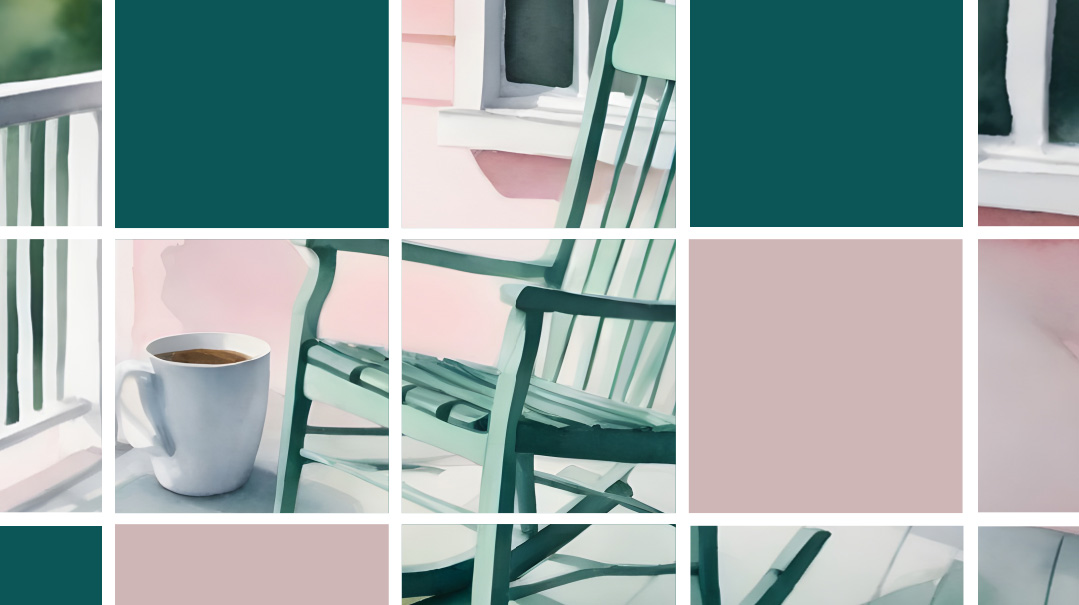From Slavery to Song
| March 23, 2021A glimpse of the greatness of Miriam Haneviah — her courage, the beauty of her actions, and the greatness of her spirit

"And Miriam called to them, ‘Sing to Hashem… He is highly exalted, the horse and its rider He has thrown into the sea.’ ” (Shemos 15:21)
The guttural tones of the king’s messenger wafted in through the doorway. I sheltered in the shadows nearby, straining to hear his words.
“Every male child that is born, you shall cast into the Nile!” he called. I drew in my breath sharply. So this is the latest decree from Pharoah’s palace. Is it not enough for him that he’s deprived us of our freedom, that he’s wounded our bodies? This… this is unthinkable.
What mother could throw her newborn child to his death, could see him tossed among the Nile’s waves, as the long, dark shapes of the crocodiles lurking within move through the water? This will rob us of the last vestiges of sanity we still possess in the nightmare that is our lives.
The world is silent to our pain — ignoring our slavery, ignoring the backbreaking labor we are sentenced to. Our lives are of no value to them. Will they care when the Nile runs red with the blood of innocent babies?
Later, when I went out to the courtyard, the women were all murmuring about this new decree. They said that Pharoah passed it because he fears that a Jewish savior will be born.
A savior? What can he be thinking? For over a hundred years now, Jewish babies have been born into lives of deprivation and degradation. A savior? He is mad, this king, mad and cruel, to even imagine that a nation so oppressed could dream of redemption.
Abba returned from his work on the field, his face drawn. He sat on the low stool that we save for him, and my mother sat down near him. They spoke in low tones, then my mother went white and turned away, retreating to the corner where the baby slept. Abba sighed heavily, a heartrending sound.
“Do your cuts and bruises hurt?” I whispered. Abba didn’t answer. It was a long moment before he lifted his eyes and looked at me. I was frightened by the tormented look in his eyes. “What happened?”
Abba’s lips quivered. “My child, did you hear about the new decree?”
I nodded.
“And what are we going to do? Can we become murderers, can we kill our children with our very own hands? This is impossible!”
“So what are we going to do?”
Abba pressed his lips together, then continued talking, averting his gaze. “The gadol hador, Amram from Shevet Levi, left his wife, and everyone is following his lead. Only until the decree passes. What difficult days… too difficult to bear. His wife, Rebbetzin Yocheved, is alone now with their three-year-old son Aharon and their five-year-old daughter Miriam.”
I looked up at him in fright. “Are you leaving the house too?”
Abba cried.
So did I.
When I went out to our yard this morning, I saw Miriam standing alone in the distance. Poor girl. It was hard to look at her. Immediately after she was born, she came down with a serious illness that left her features disfigured. Who would ever marry her, even with her yichus?
No wonder her father called her Miriam. Our nation has been immersed in bitterness from the moment she was born, and then she has her difficult personal nisayon, knowing that no man will want to marry her.
But as I stared at her, I realized that Miriam did not carry herself like a sad and lonely girl. I saw light, serenity, and an inner strength. She walked slowly, nobly, like a queen, and there was something about her bearing that made everyone stop and listen. Perhaps her incredible strength makes up for her appearance.
Miriam walked resolutely toward the beis midrash, where she spoke to a man standing outside for a few moments before he went inside. She must have asked him to call her father. This new situation must be so hard for her.
I was right about Miriam: she may be young, but she is strong and courageous. Last night, when she went to see her father, she challenged him. She told him that his decree was even worse than that of Pharoah’s! For the king’s decree, she said, would only kill the baby boys, while his decree ensured that there would be no babies born at all.
In addition, she told him, she had had a nevuah: Her mother, Yocheved, was destined to have a baby boy who would take the nation out of Mitzrayim. It’s not for naught that she is called Puah — for she had the nerve to appear, l’hofia, before her father.
Amram listened to her words carefully. “You are right,” he told her, and made plans to quietly remarry Yocheved.
“But who will tell Bnei Yisrael?” Miriam asked. And again, Amram acquiesced to the wisdom of his young daughter. With three-year-old Aharon on one side of him and five-year-old Miriam on the other, tambourines in hand, he walked to a magnificent chuppah where he remarried Yocheved.
At the end of the procession, Miriam hid her tambourine. I’m not sure why.
Abba came back home! I’m so happy. Everyone has been thanking little Miriam, but all the compliments and thanks seem to have no effect on her. She just smiles in response, mysteriously, as if she knows something we don’t.
Months passed. One morning, I heard an incredible secret: Yocheved had a baby boy! What a miracle! Yocheved is one hundred and thirty years old!
As soon as the baby was born, the house filled with light. Amram hurried to Miriam, kissed her on the head, and said, “My daughter, your nevuah has been fulfilled.”
But the joy over the birth of the baby is mixed with a bit of concern, because the baby was born three months early. He’s having difficulty breathing, and there is doubt as to whether he’ll survive.
When I went out to the field today, I met Miriam gathering thin pieces of straw. “What are you doing?” I asked her.
“They’re for the baby,” she told me. “My mother sticks the straw into his small lungs to help him breathe. She does this all day.”
What mesirus nefesh! Later, I heard that Yocheved had put the baby into a small, well-padded box on top of an oven to help the tiny baby maintain his body heat.
My neighbor just came in, panting, a look of fear on her face. “Did you hear?” she asked me breathlessly. “Pharoah almost murdered the midwives — Yocheved and her daughter Miriam!”
What a fright!
The king had summoned them, infuriated. How dare they disobey his decree and allow the baby boys to live? Yocheved attempted to pacify the king, but then Miriam stood up straight, faced Pharoah, and said fearlessly, “Woe to this man when Hashem comes to punish him! Woe to you from the day of judgment; woe to you from the day of rebuke!”
Enraged, Pharoah announced that Miriam should be killed. Yocheved — or as she was called in her role as midwife, Shifra — tried to calm the king. “Are you paying heed to her words? She’s a mere child, she doesn’t know anything.”
But Miriam did not back down. She stood there silently, calmly meeting Pharaoh’s gaze. That girl is made out of the same stuff as kings! Her stance conveyed her confidence: “My nevuah will be fulfilled — and your punishment will come.”
Yocheved and Miriam returned home, unharmed. They continued to conceal the baby for three months, helping him breathe and feeding him with endless patience. The tiny baby began to grow, and began crying and cooing like other babies. Yocheved realized that she had no choice: She needed to cast him into the Nile. If she didn’t, what would she say to Pharoah?
I was sure that Yocheved now regretted her status, wishing that she were like the rest of the Jewish women who went to the fields to give birth and left their babies there. But her circumstances were different. Everyone knew she’d given birth, everyone knew about the care she’d given her premature infant. Her every move was scrutinized.
Amram and Yocheved left the house together. Amram went first, head down, and Yocheved followed him, carrying a small basket covered in black pitch. Miriam trotted alongside them, whimpering.
Yocheved walked slowly, wishing she could push off the inevitable. Many families went outside to watch them, hoping that their presence would serve as comfort. A chilling silence reigned.
This wasn’t a private tragedy; it marked a loss for the entire community. For several months, the Jews had believed that there might be miracles, that Miriam had been right and the geulah would sprout from this child. But with each additional step that Amram and Yocheved took toward the Nile, the light of the people’s hope was being extinguished, their belief dissolving in the turbid river waters.
Finally, they reached the river. Yocheved approached the water’s edge and placed the basket in the river. Nearby, I heard a woman wonder why Yocheved had troubled herself to waterproof the basket and to make sure her baby wouldn’t smell something unpleasant during his last moments.
“Hush,” another woman told her “A mother is a mother and every mother wants to do good to her baby until his last breath.”
The current began to pull the basket from the shore — taking with it the nation’s hope.
Yocheved and Amram stood by the shore, unable to wrest their eyes from their son, who was slowly drifting away. Miriam, too, refused to leave.
“Go home immediately!” her mother scolded and tapped her on the head. “My daughter, what has become of your prophecy?” she added bitterly.
Miriam didn’t answer, just turned on her heel and hurried to hide behind the reeds, where she stood motionless. I approached her, sure I’d see pain in her eyes, but I was shocked to discover serenity and curiosity.
“Are you sad, Miriam?” I asked gently, wondering if she grasped the depth of the loss.
“Why should I be sad?” Miriam shrugged. “Shhh… I’m waiting to see what will happen to our baby. I’m sure he won’t die. I know he needs to take Bnei Yisrael out of Mitzrayim. I’m curious to see how Hashem will arrange for him to be saved.”
Foolishness and fantasy. I shook my head. Or perhaps… could it be nevuah? Miriam continued to stand by the river’s edge for 15, maybe 20, minutes, when suddenly, there was a commotion around her.
“The princess is coming to bathe in the Nile!” women whispered to each other in fright before quickly disappearing. Who would dare be there when her highness arrived?
We all scattered, besides Miriam, who remained in her hiding place.
Bisya and her entourage of maidservants were left alone on the shore. One maid accompanied Bisya as she went down to bathe. Bisya washed herself for several minutes, when she suddenly heard the sound of crying.
Bisya was curious — and shaken. Until then, her father’s decree had been purely theoretical; since the Jewish women delivered their babies in the fields, no babies had yet been thrown in the Nile. This was the first time she’d seen her father’s decree being fulfilled.
Bisya extended her hand toward the basket and opened it. Inside she saw a handsome, radiant baby. She lifted the basket and waded out of the water. The baby continued crying.
Her maid peeked into the basket. “He must be hungry.”
“Find a wet nurse immediately!” Bisya commanded her. Soon, Egyptian women began coming to the river’s edge. Each one tried to feed the baby, but each returned the crying baby to Bisya. “I’m sorry, he refuses to eat,” they told her over and over again.
Miriam, still watching, saw Bisya’s distress and realized that the baby, who was destined for greatness, would not nurse from an Egyptian woman. She shuddered. He doesn’t want to defile his mouth, she realized. A mouth that will speak with the Shechinah must remain pure. Determined to find him a kosher wet nurse, she left her hiding place and hurried to Bisya.
“Your Highness, would you like me to find a Hebrew wet nurse to nurse the child?”
Bisya looked the brave little girl, “Who are you?” she wondered aloud. “How do you have the courage to speak to me?”
Undaunted, and confident that Bisya wouldn’t kill her, Miriam continued. “Your Highness is surely aware that if an Egyptian woman discovers that the baby is circumcised, she is liable to kill him out of hatred for the Hebrews. If you’d like to keep him safe, please allow me to find a Hebrew wet nurse to watch the baby.”
Bisya remained silent, well aware of how angry her father would be if he were to discover her actions.
Miriam persisted. “Your highness, the baby is crying. Should I go quickly?”
Bisya laughed, then waved her hand in permission. “Look for one, if that is your desire.”
Miriam had been waiting for precisely that moment. With strength she didn’t know she had, she began running quickly toward her house. “Ima, Ima! Come quickly to nurse your son who was pulled out of the water! Ima!!!” she screamed. Doors opened all around and a thin ray of hope reentered the hearts of the tormented nation.
Yocheved hurried to the river’s edge and was shocked to discover that, indeed, her daughter was not imagining things. Her little baby had been pulled out of the water and was in the princess’s arms. “I’d be happy to try and feed the child,” she said quietly. Within seconds, blessed silence reigned.
Bisya looked at the older woman and commanded her in a threatening voice, “From this moment on, you are my maidservant and the child’s nurse. Raise him until he is weaned, and then, return him to me.”
The sand dunes of Egypt never saw a “maidservant” as joyful as Yocheved as she embraced her son. “I’ll care for you and raise you, as per the princess’s command!” she whispered happily into her baby’s ear.
I remember it as if it were yesterday… the wedding of Miriam bas Amram and Kalev ben Yefuneh. What a special simchah!
Miriam had been single for so many years, painfully aware that no man would be interested in her. Yet despite her disfigurement and weak constitution, Kalev had wanted to marry her. He was wise enough to see her strength of character, devotion, and righteousness.
Miriam asked the guests at her wedding to call her Efras, to hint that Bnei Yisrael has multiplied (vayifru) in her merit. After all, she was the legendary midwife….
It’s been 80 years since Pharoah first passed his terrible decree. The days have been too difficult to bear and the nights only worse — while the days are paved with pain, blows, and torture, the nights are full of nightmares and depressing thoughts about the degradation we’ve been subjected to for so many years.
“Remember how naïve we used to be?” my friend asked me yesterday. And I, who had forgotten what naiveté was, asked what she was referring to. In response, she merely smiled a crooked, pain-filled smile, and mumbled, “Nu, really… Don’t you remember that Miriam, Kalev’s wife, had a little brother? They had said he would bring the geulah…. Do you remember that people said that his sister Miriam was a neviah?” She gave a dry laugh.
“You can’t know…” I whispered.
She pulled herself to a standing position, her shaking, bloody legs barely supporting her. “What are you talking about?” she asked defiantly. “What geulah are you dreaming about?
“True, Moshe was saved by an open miracle from drowning in the Nile, but the child grew up like an Egyptian in Pharoah’s palace! And true, his house filled with light the moment he was born, but he got into trouble with the king and fled Mitzrayim. He left all of us here, enslaved and oppressed.
“You know what? Maybe Miriam was right. It seems that her brother was redeemed… after all, he’s not here; he’s not suffering with us.”
I remained silent for several moments. “But maybe it’s true,” I said finally. “Maybe the mixture of light and darkness we’ve been experiencing are a result of the depths of the galus? Since Miriam was born, the bondage has worsened. Maybe that’s the nature of galus? Rays of light of Divine favor, followed by fear and great darkness.
“True, many years have passed since Miriam’s nevuah. Eighty years of pain, slavery, and sorrow. But isn’t that what it means to have emunah in the yeshuah? We must have faith and wait for the geulah.”
I waited expectantly for leil Shabbos. Recent events — Moshe’s return, the signs he performed in front of the zekeinim, his going to Pharoah — have aroused forgotten hope in all of us.
I walked from my home to Rebbetzin Miriam’s house, as I do every Shabbos and Yom Tov, accompanied by a stream of women with the same destination, all hoping to learn more about the Master of the world. When we reached Rebbetzin Miriam’s home, we found her sitting on a chair at the edge of the room, her face shining like the afternoon sun, welcoming everyone who came.
Rebbetzin Miriam is to the Jewish woman in Mitzrayim what her brother Aharon is to the men — an anchor and refuge amid the suffering within the squalor of bondage. How lucky we are to have her.
It’s impossible to remain apathetic in the face of Rebbetzin Miriam, who spends her days and nights publicizing the word of Hashem. Like her brother Aharon, Rebbetzin Miriam guides the women with peace and love; she is like him in her power of nevuah as well. I remember how she risked her life for her brother, who has grown to become a prophet even greater than Aharon and Miriam. And now he’s here… heralding the imminent geulah.
Are things about to change? From now on, Moshe Rabbeinu will receive Hashem’s commands and pass them on to Aharon and Miriam, who will teach them to the men and women. Rebbetzin Miriam will be everyone’s personal teacher. It’s no wonder that she was promised the house of kingship as her future reward; even now, she is a queen, and we her loyal subjects.
We were free. At long last, we were free! We left Mitzrayim, and Moshe led us into the desert. For seven days we walked, each step taking us further from our tormentors. But then, as we stood on the banks of the Yam Suf, they came up behind us, ready to drag us back to servitude.
In front of us, the frothing sea. Behind us, the seething Mitzriyim. It seemed the end was near.
And then, in front of my very eyes, the sea split! It split!
I didn’t have the time to leisurely admire at the incredible miracle — we were propelled forward by fear of the Mitzrim, who stood on the shore, debating whether or not to follow us. I hurried along, marveling at the dry, level ground we were walking on, full of lush, fruit-laden trees. To my right and left I saw other shevatim — they were also running, fleeing from Pharoah.
Suddenly I heard a terrible shriek — followed by the sound of galloping horses.
“They entered the sea! They’re following us!”
I continued running forward, terrified. Ahead of me, I saw Miriam running, a tambourine in her hand.
I climbed up to the shore, where an incredible tumult made me turn around — and what I saw left me rooted to my spot.
A high wall of water tumbled down on the heads of the Mitzrim with a resounding crash. There was a terrifying silence — seconds later, it was shattered by the screams of the drowning men and the groans of the horses. Mighty waves threw the Mitzrim to and fro. I saw heads bobbing up, then disappearing into the depths. It was a sight both horrific and moving.
I stood trembling, hardly able to believe my eyes. The entire Egyptian army — those accursed wicked ones, who’d so tortured us — they were drowning!
Not a sound came from the Jewish camp. We stood together gazing at our last sight of galus Mitzrayim, at the closing scene of hundreds of years of bondage.
Eventually, the winds died down and the sea’s fury subsided. The screams waned.
Still, we remained silent.
Where are they — the hundreds of thousands of cavalrymen, sword bearers, horses and chariots?
Suddenly, I heard a loud sound coming from the men. Thousands of voices, joined together, crying, announcing, demanding. “Ashira laHashem ki ga’oh ga’ah — I will sing to Hashem for He is highly exalted!”
Miriam was concerned that the woman would grumble that only the men were singing — after all, the geulah was in their merit. Therefore, she hurried to sing shirah.
I looked toward Miriam and saw her holding a small, old tambourine. In a flash of illumination, I recognized it. Eighty-one years ago, she had used that same tambourine when her mother, Yocheved, returned to the home of her father, Amram.
Now, she lifted the tambourine toward the sky and began shaking it. When I think about it, I realize that it is appropriate that Miriam chose an instrument that creates music when it is shaken. Gilu b’radah — rejoice with trembling! When we give thanks, Miriam was reminding us, we must remember that we’re standing before the King of kings!
Miriam extended her hand upward, showing the tambourine to the men and women.
“See this tambourine! Remember that little girl who stood by her brother’s side and saved him! See how great is the power of emunah, the strength of bitachon! Do you see Hashem’s Hashgachah?!”
The sounds and notes ascended heavenward, until they reach the malachim, who requested to sing shirah before the women did. But Miriam saw with her ruach hakodesh that Hashem desired the singing of the women and she continued shaking her tambourine, inviting the malachim to sing along with her.
Sing! Sing to Him. Sing praises to Him!
“Prophecy only rests on a person who is happy!” Miriam cried out. “And it is appropriate that women, who know the pain of childbirth, play music to increase the power of happiness!” More and more women stuck their hands into their sacks and took out tambourines, which they had prepared ahead of time. I also pulled out a small tambourine, and the heavens were filled with the soaring notes.
Only then, under cover of the fervent music, and after Miriam had ascertained that there was no fear of the men hearing the women singing, did the neviah begin her glorious, heavenly song! The sound of the tambourines aroused boundless joy.
It was clear that we had all merited nevuah, for the same words burst forth from all of our hearts. Moshe sang shirah with the men on one side, and Miiram sang shirah with the women on the other side, her face shining like the sun, her joy contagious “Hashem has relieved my shame!” she murmured. “It took 80 years, but the little girl’s nevuah has been fulfilled, and everyone recognizes its accuracy.”
Once again, the entire nation’s eyes were on Miriam.
Miriam wanted to help her brother, so she spoke to Aharon, expressing her concern about how Moshe had separated from his wife Tzipora. She didn’t, chas v’shalom, speak behind Moshe’s back; she talked to Aharon in Moshe’s presence.
But Hashem is exacting with the deeds of people as holy as Miriam, and immediately after that conversation, the tzadeikes’s body became covered with tzara’as, a punishment for lashon hara.
Miriam accepted her punishment with humility and submission and walked to the edge of the camp to quarantine for seven days. I saw her watching us leave Chatzeiros and continue on our journey through the desert, leaving her behind. Suddenly, though, we stopped — then circled and began returning to where we had been.
“What happened? Why aren’t we continuing?” I asked my son.
“How can we continue if the tzadeikes isn’t with us? If Miriam has tzara’as, we’ll wait seven days for her; remember, the Shevatim and their flags don’t travel until she goes ahead of them. She also waited — for her brother Moshe — and Hashem treats a person the way they treat others,” he reminded me.
And so we all waited seven days: the Kohanim and Levi’im, all of Bnei Yisrael, the Ananei Hakavod and the Aron — even the Shechinah itself!
When her brother Moshe heard that his sister had tzar’aas, he made a small circle, stepped inside it, and began to daven. “I will not budge from here until my sister, Miriam, is healed!” he cried. “Master of the World, you have already made me a doctor. If you heal her, good, and if not, I will heal her!”
Hashem replied to him, “Why are you screaming?”
“Master of the World,” Moshe replied, “I know what pain she is in.” For Moshe too had suffered the pain of tzara’as, when he gave the signs of the redemption to Bnei Yisrael.
Once Moshe davened for her, Miriam was healed — and we were able to resume our travels.
In my old age, I have difficulty sleeping, so it was not unusual for me to awaken in that strange space between night and day. I walked out of our tent to the vast desert and breathed in the predawn stillness. It was quiet — everyone asleep — but I was troubled.
“Something is strange,” I whispered.
Suddenly, I realized what it was. “It’s not here! The moon is not here!”
Something bad was happening…. I could feel it.
A half hour later, I saw my neighbor’s son come out to wash his hands. He bent down near the stream that flowed past their tent, then rose sharply.
His eyes met mine. “Do you have water?”
I hurried to check. Our stream had dried up as well. “I’ll go to the main well and get water for you too,” he offered.
He went on his way and returned a few minutes later, very confused. “The well isn’t there.”
“The Well of Miriam? It’s provided us with water for almost 40 years!”
“Something must have happened,” he whispered.
After several long minutes, a horrible cry pierced the air. People began pouring out of their tents, confused, frightened.
“She’s gone! Rebbetzin Miriam has passed on to the world that is all good!”
Orphaned and lonely, we escorted our teacher and leader, Miriam Haneviah, to her resting place. She merited to die in her sleep, taken from us by a Divine kiss.
I have no way of describing the pain, of detailing my personal loss. How will I manage without her advice, her compassion, her love? I am bereft.
I returned from the levayah and entered my tent. My granddaughters sat on stools and looked up at me. I sat down beside them and said, “If Miriam were here, she would hug us and comfort us, whispering, ‘Why, you righteous women? Why are you crying? My role in educating women is over. You’re ready for your role as Jewish mothers. You nobly withstood the tests of the midbar!
“ ‘Go my daughters! Go by virtue of your yiras Shamayim, tzniyus, and spiritual strength, by the power of mussar, devotion, and Torah, and continue to raise legions for Hashem.’ ”
“Savta, all women of all time will know Miriam Haneviah, right?”
“They will and they won’t,” I answered them. “You know that Moshe was charged with the chinuch of ‘asos mishpat — doing justice;’ Aharon was charged with ‘ahavas chessed — loving kindness;’ and Miriam was charged with ‘hatzneia leches — walking modestly.’ Her deeds were completed modestly and in secret.
“Yes, coming generations will know her name. But will they know the beauty of her ways, her courage, and the greatness of her spirit? I hope so. I hope they invest the effort to learn about her and learn from her.”
Behind the Scenes: The Zechus
Mishpacha asked me to research Miriam Haneviah. As usual, I began with pesukim and meforshim that mention her name. After a week, I felt as if I’d reached a dead end. I had learned a lot, but all of the material I’d gathered was well-known.
“There’s no point in writing about what everyone knows,” I reported regretfully.
I sat in front of my computer at night and closed my eyes in prayer. HaKadosh Baruch Hu, give me the zechus to write an article about Miriam Haneviah. Give me the zechus to get a glimpse of this extraordinary woman.
And I tried again.
This time, Hashem led me to incredible sources. Each day, my excitement grew as I learned more.
Writing this article took over a month of serious work. I spent long hours studying and scrutinizing, searching the thousands of places where Miriam’s name is mentioned, reading hundreds of meforshim and midrashim.
This article is based on dozens upon dozens of sources, which we have not listed due to space constraints. I must emphasize that all of the descriptions here, with the exception of the story’s narrator, are based on verified sources.
Finally, after over a month of work, I was finished. With a pang, I pressed the “send” button — and bid Miriam goodbye.
Farewell, Miriam Haneviah, my teacher. You showed me what emunah is and how great is the strength of bitachon. I’m sharing your life story with my sisters, and I daven that I’ve given them a glimpse into your courage, spiritual strength, and joy.
(Originally featured in Family First, Issue 736)
Oops! We could not locate your form.






